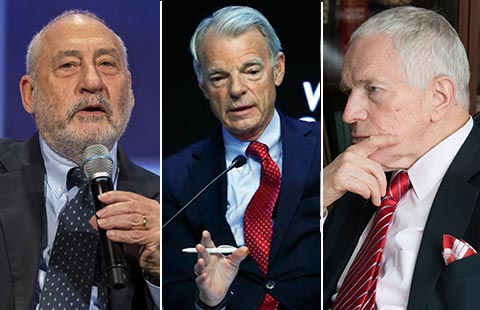China's Internet regulation not trade barrier
(Xinhua) Updated: 2016-04-15 11:21BEIJING - It is unfair to place the label "trade barrier" on China's web regulation, which is in line with WTO articles and aimed at safeguarding cybersecurity, not discriminating against foreign firms.
The Office of the United States Trade Representative (USTR) said in its new annual report that "China's filtering of cross-border Internet traffic has posed a significant burden to foreign suppliers."
The report listed China's Internet regulatory regime as one of the barriers for trade in services, in the latest excuse the US government has used to attack China's cyberspace governance.
China bars access to some foreign websites because they refuse to abide by the country's laws and regulations.
It is obviously risky for any country to receive unchecked inflows of information, particularly at a time of rising global instability.
One of the WTO principles is trade without discrimination, which, however, does not translate into absolute freedom or rule out reasonable regulation.
The General Agreement on Trade in Services (GATS) allows members to contravene their obligations as necessary measures to "protect public morals or maintain public order."
China's blocking of websites and filtering of traffic are aimed at safeguarding cybersecurity and maintaining social stability.
Cybersecurity is an important issue universally acknowledged, including by the United States. Since he took office, President Barack Obama has identified cybersecurity as one of the most serious economic and national security challenges.
In 2014 alone, the United States passed the Cybersecurity Enhancement Act, National Cybersecurity Protection Act and Federal Information Security Modernization Act.
China's cyberspace regulation has successfully curbed the spread of imported pornography and terrorist information in a country with the world's largest population of web users.
Some of the blocked sites are social media that carry a sea of posts by people across the world, including those with an outdated mentality who still deem China as a rival or threat.
In contrast, bona fide, compliant Western e-commerce websites such as Amazon and eBay are easily accessible in the lucrative China market, indicating that the country does not erect trade barriers in cyberspace.
In fact, USTR data shows the United States has continued to record a substantial surplus in service trade with China as its exports of services to China totalled $42.5 billion in 2014, up from $37.8 billion in 2013.
"This success has been largely attributable to the market openings phased in by China pursuant to its WTO commitments," said the USTR report, describing the prospects for US service suppliers in China as promising.
Every country has the right to govern cyberspace in its own manner. The Internet is not beyond law.
At the same time, China will honor its commitment of opening wider to the outside world, rather than setting up any business barriers.
The government will continue to work for a better environment for foreign-funded companies as long as they abide by Chinese law.
If the United States continues to muddy the waters of commerce with politics, rows will only get noisier and economic ties will probably be hurt.
- Chinese companies confident on bright future for retailers, consumers
- Hungary issues govt bonds in renminbi
- Huawei launches Africa's first 4.5G demo in Namibia
- China's new yuan loans rise in March
- China's industrial production growth quickens to 5.8% in Q1
- China property investment grows 6.2% in Q1
- China's retail sales grow 10.3% in Q1
- China's fixed-asset investment up 10.7% in Q1

















